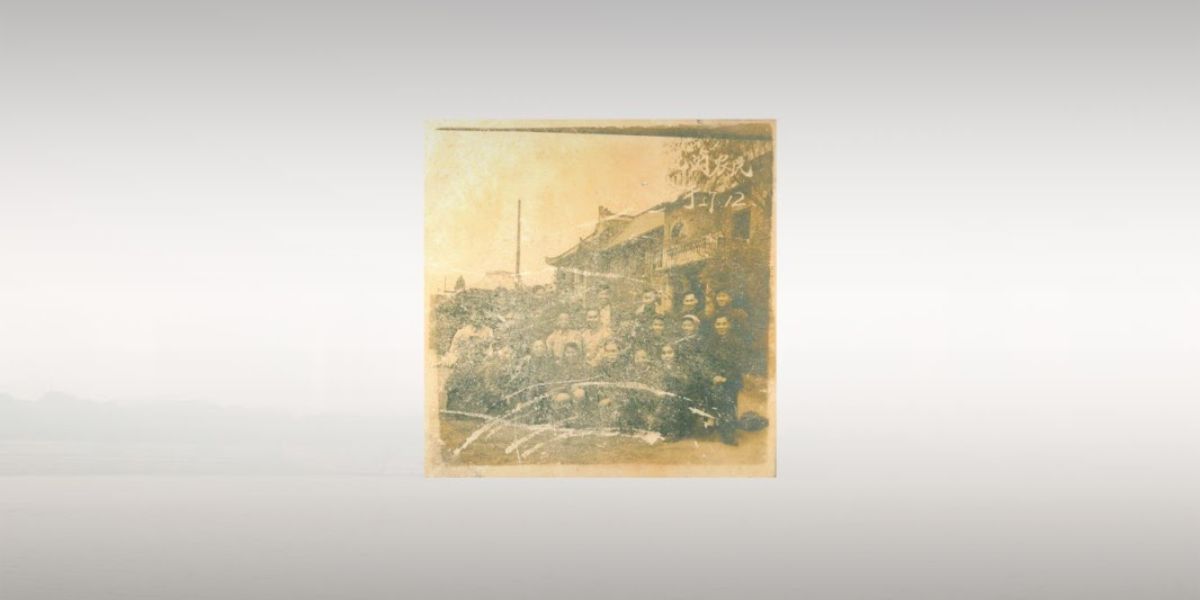By: Elena Hart
Memory as Method: The Poetics of My Grandfather
In the work of London-based multidisciplinary artist Yichu Li, whose practice merges image-making, moving image art, and sound-based performance to interrogate identity, power, and memory, memory does not simply sit still. It refracts, pulses, and evolves—stretched across time, gesture, and digital interface. With her image-making series My Grandfather (originally published in 2020, re-edited in 2022) and its transmutation into the immersive moving-image project YICHU 1.0: UPLOADING (2025), Yichu develops an emotional and formal vocabulary that invites reflection on what it means to remember in the algorithmic age. Rather than function as a conventional portrait series, My Grandfather unfolds as a poetic field of presence. In Lost Memories, Yichu juxtaposes a historical group photo of her grandfather and his friends with a hazy river scene. The soft focus evokes spatial dislocation—as if memory gently looks back at the viewer. These photographs do not aim to evoke sentimentality. Instead, they evoke what Roland Barthes called the punctum—“the sting of truth in the ordinary.”
Rewriting Lineage: Feminism and the Anti-Archive
As a Chinese female artist, Yichu’s engagement with ancestral subjectivity challenges the patriarchal structures often embedded in family narratives. Her work does not reinforce hierarchy. Instead, she creates a speculative visual authorship—a feminist re-inscription of memory, shaped through abstraction, tenderness, and digital poetics. Originally published by Aperturist Photography (China) in May 2020, the still image series was later re-edited and re-sequenced in 2022 to establish a deeper conceptual framework. Reframed in the context of her later moving-image work, the photographs became not just documents of a life, but the visual architecture upon which Yichu built an emotionally intelligent ritual of remembrance. What makes Yichu’s work notable is not simply that it resists patriarchal memory structures—it actively questions them. Her images do not serve to illustrate legacy; they reconstruct it. There is no inheritance here—only inscription, layering, and transmission. This is not a memory as a monument. It is a memory as a method: slow, intimate, and structurally aware.

(My Grandfather: Riding the Crane into the Western Skies)
From Photograph to Performance: YICHU 1.0 – Digital Space as Ritual Ground
The transition from still image-making to moving images is not a departure in Yichu’s work—it is a natural deepening. YICHU 1.0: UPLOADING, the first chapter of her moving image series, reanimates the emotional core of My Grandfather through movement, light, and sound. Where the photograph preserves, the digital performance brings to life. Where My Grandfather was interior and observational, UPLOADING is embodied and enacted. Yet the discipline of care—the ethics of attention—remains central. Yichu’s engagement with emerging technologies is subtle, intimate, and precise. She does not use digital tools to generate spectacle, but to construct atmospheres of resonance. In her hands, the screen becomes a sensory threshold—where image, sound, memory, and myth coalesce. This digital moving image language offers quiet encounters and accumulations of feeling—structured less around linear narrative than by emotional pacing. It is not intended as an archive. It is a living system of visual return.
Ancestral Transmission in the Algorithmic Age
Yichu’s practice spans image-making, audiovisual live performance, and sound-based moving images installation, often presented in immersive or site-responsive environments. Grounded in a techno-feminist lens, she draws from mythology, cyber theory, and embodied resistance to create works that feel both ancient and speculative, poetic yet architecturally precise. Yichu’s visual art is not anchored to place—but to presence. And her collaborators are not only performers and programmers—but ancestors.

(My Grandfather: Return)
My Grandfather and YICHU 1.0 have garnered critical attention internationally, with exhibitions and recognitions from Aperturist Photography (China), UCCA AI Artist (Beijing, China), IEEE ICME AIART Gallery (Nantes, France), and the Asia Emerging Artist List (Hong Kong, China), among others. But Yichu’s impact lies not primarily in institutional prestige—it lies in the care with which she reshapes memory into a form that can be felt, re-seen, and re-lived. These are not memorials. They are transmissions.
Disclaimer: The views expressed in this article are those of the author and are based on available information and interpretations of the works discussed. While every effort has been made to ensure accuracy, the content should not be construed as definitive or exhaustive in its analysis of the artist or her work.


















